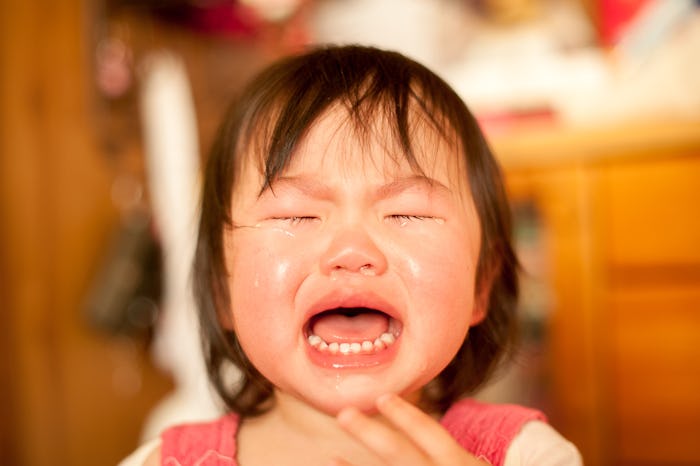Life

5 Scientific Reasons Your Toddler Throws Tantrums
If my time parenting two toddlers has taught me anything, it's that toddler tantrums are as unpredictable as the toddler themselves. Sometimes there's a calm before the inevitable storm that follows me denying a request for more ice cream. Other times, their meltdowns have a build up period that rivals a war scene from Braveheart — war paint and all. Although its impossible to truly avoid tantrums altogether, learning the reasons for toddler tantrums (looming, eminent, impending are all appropriate verbs as well,) can help save your sanity and your child's pent up energy for something more useful.
Granted, every toddler is different and "melt down triggers" will be different from one child to the next. My youngest daughter — the one who insists on thanking me for everything, from changing her diaper to lying her down at night — has meltdowns when she's overly tired. The word "no" is a warning to be heeded, and I rarely have problems with her listening. On the other hand, my older daughter is a force to be reckoned with. "No" is an encouragement to push further and tantrums happen on the regular, even with boundaries in place.
Although age and temperament play a huge role in how to handle your child's tantrums, knowing why they happen can help you prevent them altogether or at least know how to better handle them once the storm hits.
1Your Kid Is Overtired
The Baby Sleep Site pointed out that temper tantrums from being overly tired are completely different than ones thrown out of frustration or anger. The site recommended that parents avoid them in the first place by ensuring your child has an age-appropriate bed time and the right amount of naps per day for their age.
2They Want Something That They Can't Have
The classic "I want it but mom said no" scenario is probably the most common cause of a toddler melt down. It can be tempting to cave to your toddler's wishes when you know that a tantrum will follow the word "no," but instead of fearing the meltdown and caving to their wishes, Parents noted the importance of setting boundaries for your child's behavior and following through, regardless of a subsequent tantrum.
3Their Nutrition Has Been Unbalanced
Did you know that your child's nutrition plays a strong role in their behavior? Baby Center noted that food additives have been linked to hyperactive behavior and temper tantrums in children. Although some artificial food dyes are banned in other countries, it's up to parents to limit their child's exposure. One study found that children given higher doses of foods with synthetic coloring worsened their behavior, while kids who had small amounts or none exhibited "normal" behavior for a child their age.
That's not to say that healthy nutrition will stop all tantrums from happening in the first place, but there is something to be said about avoiding them (and realizing that they may happen more frequently) after your kiddo eats their favorite (artificially flavored) snack.
4They're Unable To Accomplish Something On Their Own
Kids feel frustration just as strongly as adults do, although they aren't equipped with the mental maturity to know how to handle it other than by melting down. Dr. Sears noted that when your toddler is unable to accomplish something on their own, frustration is their natural response and if not helped, a tantrum will usually follow. Instead of discipline, these types of tantrums require empathy and help from the parent, the article stated.
5You Looked At Them Wrong
In all seriousness, toddlers are unpredictable and what sets one child off on a tantrum might be totally fine for another. Their moods change from moment to moment, so knowing your child's routine and temperament, as well as making sure they get enough rest and proper nutrition can help avoid tantrums in the future.